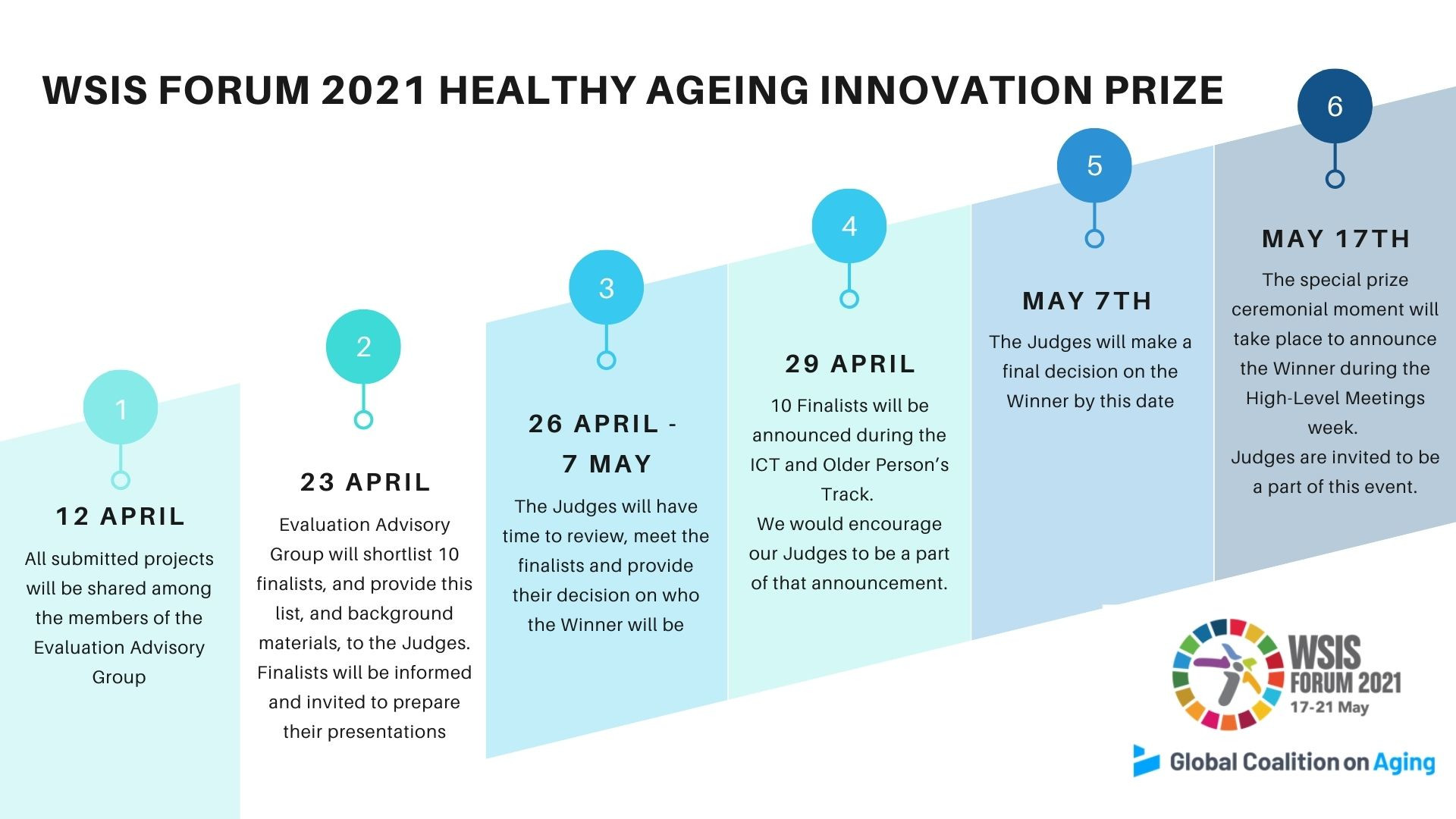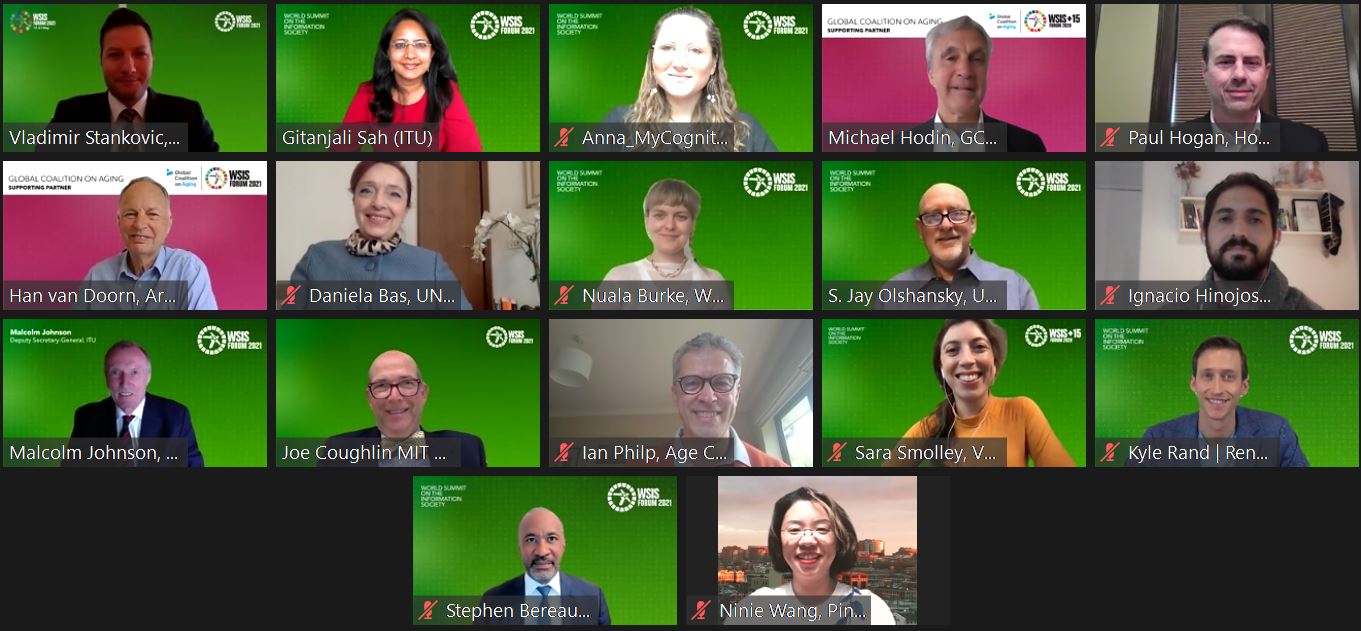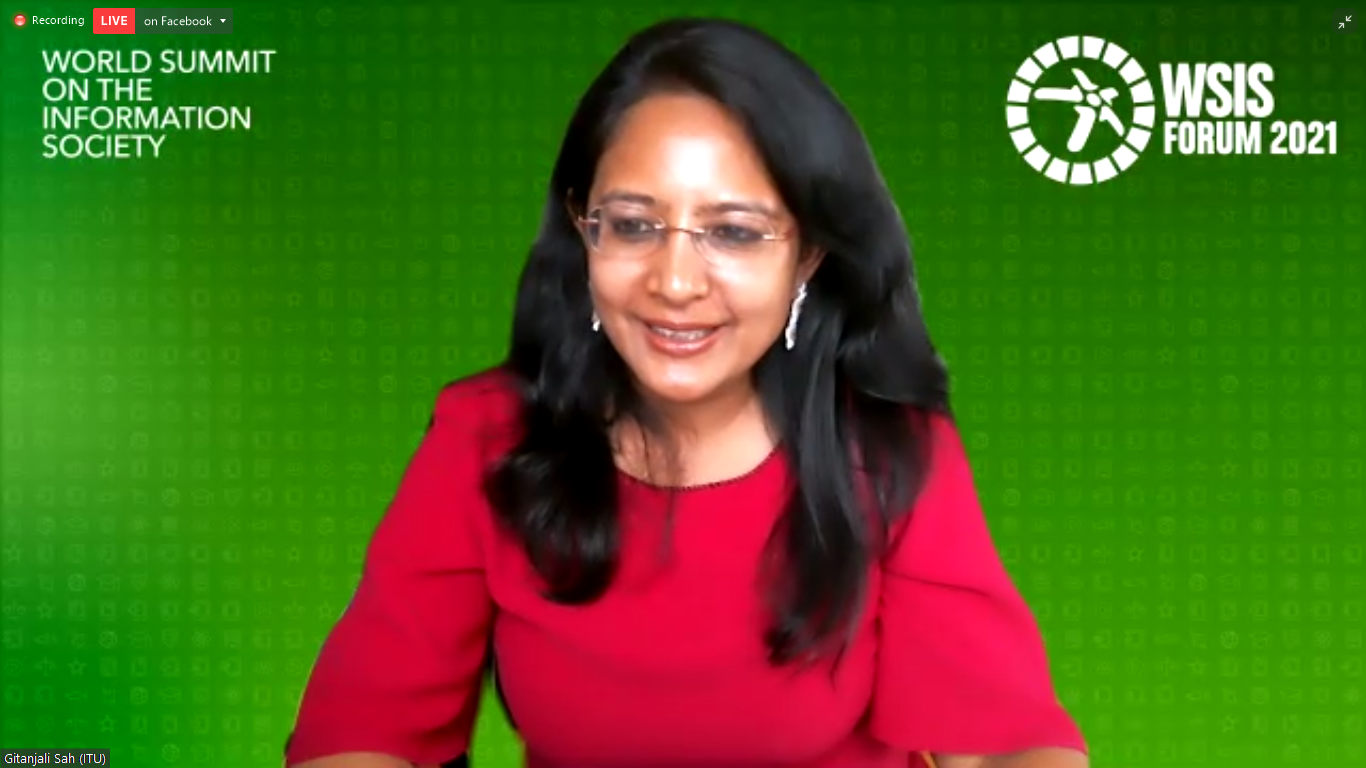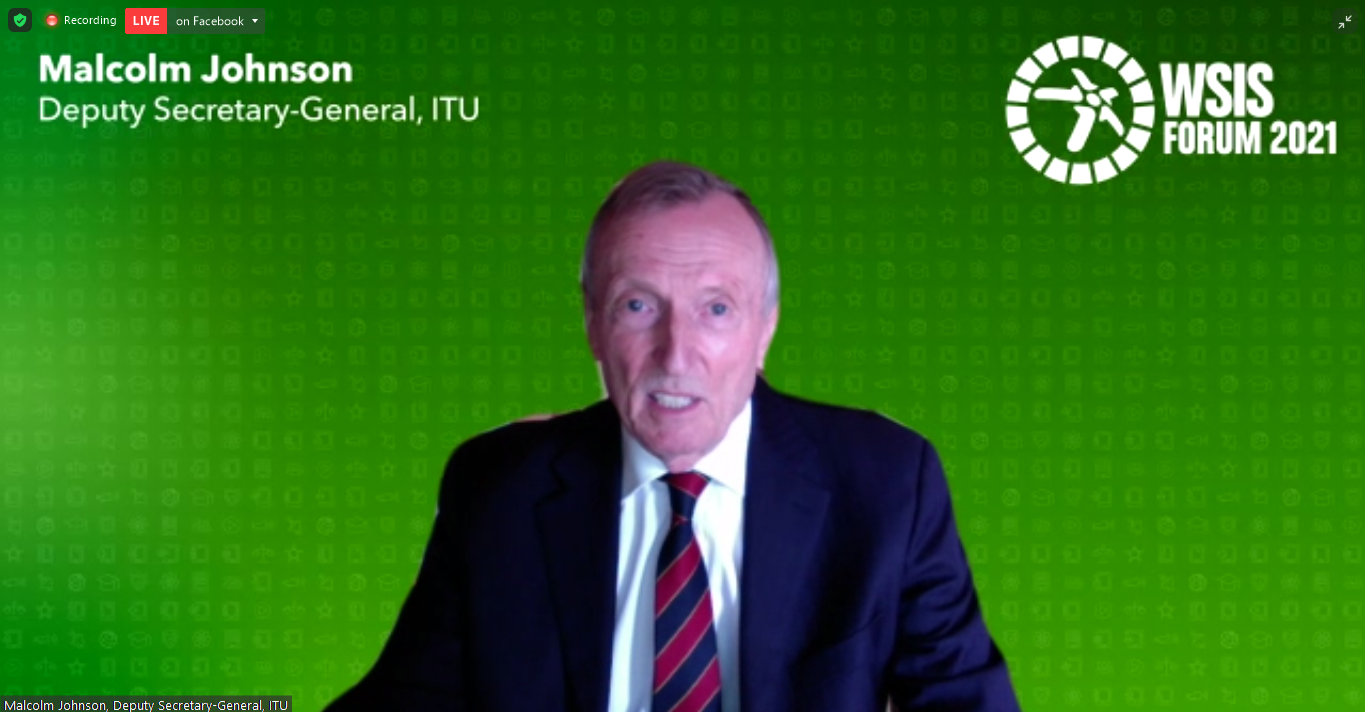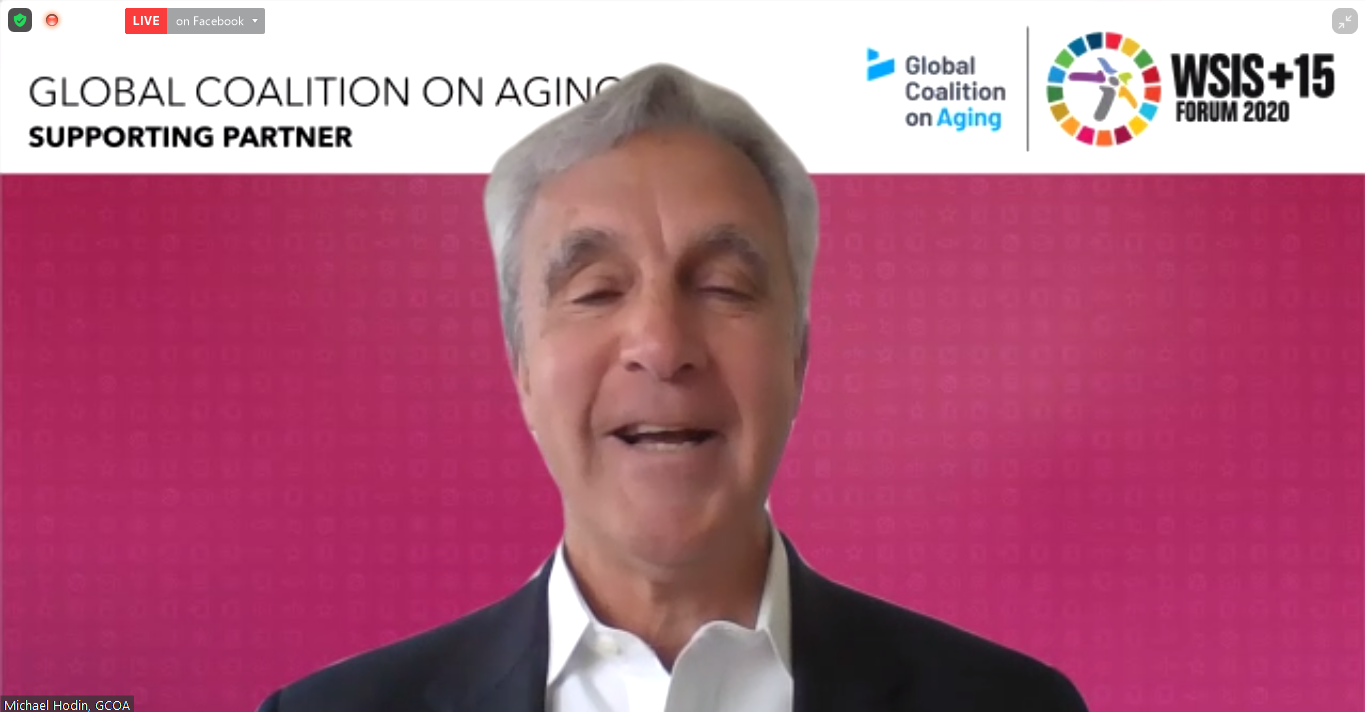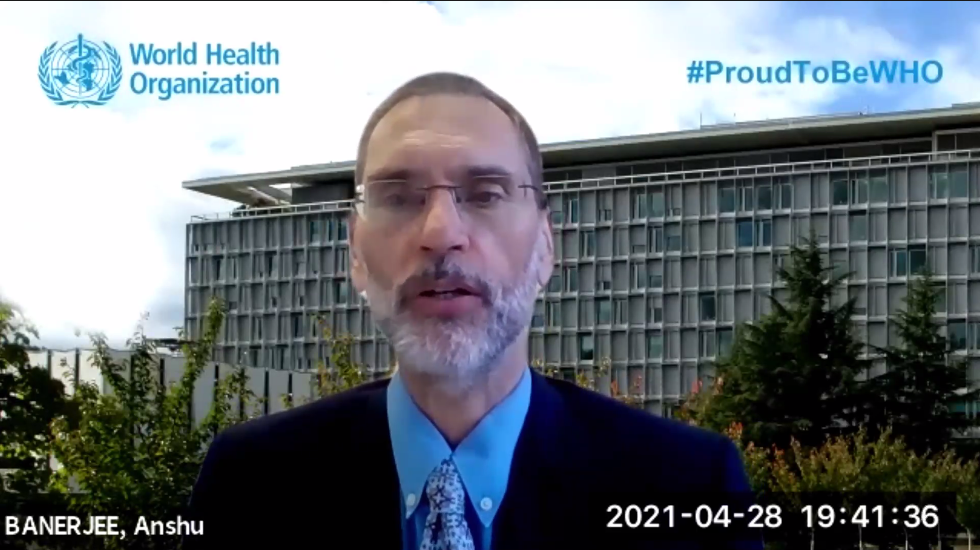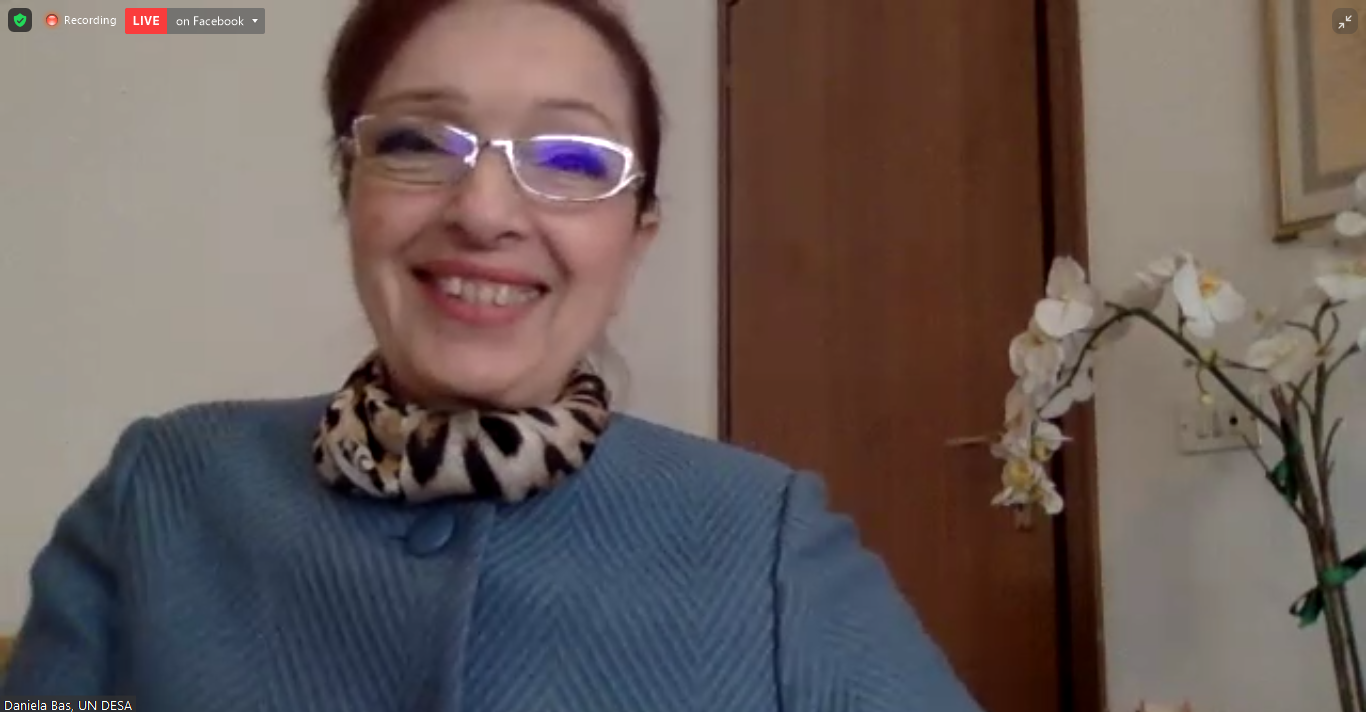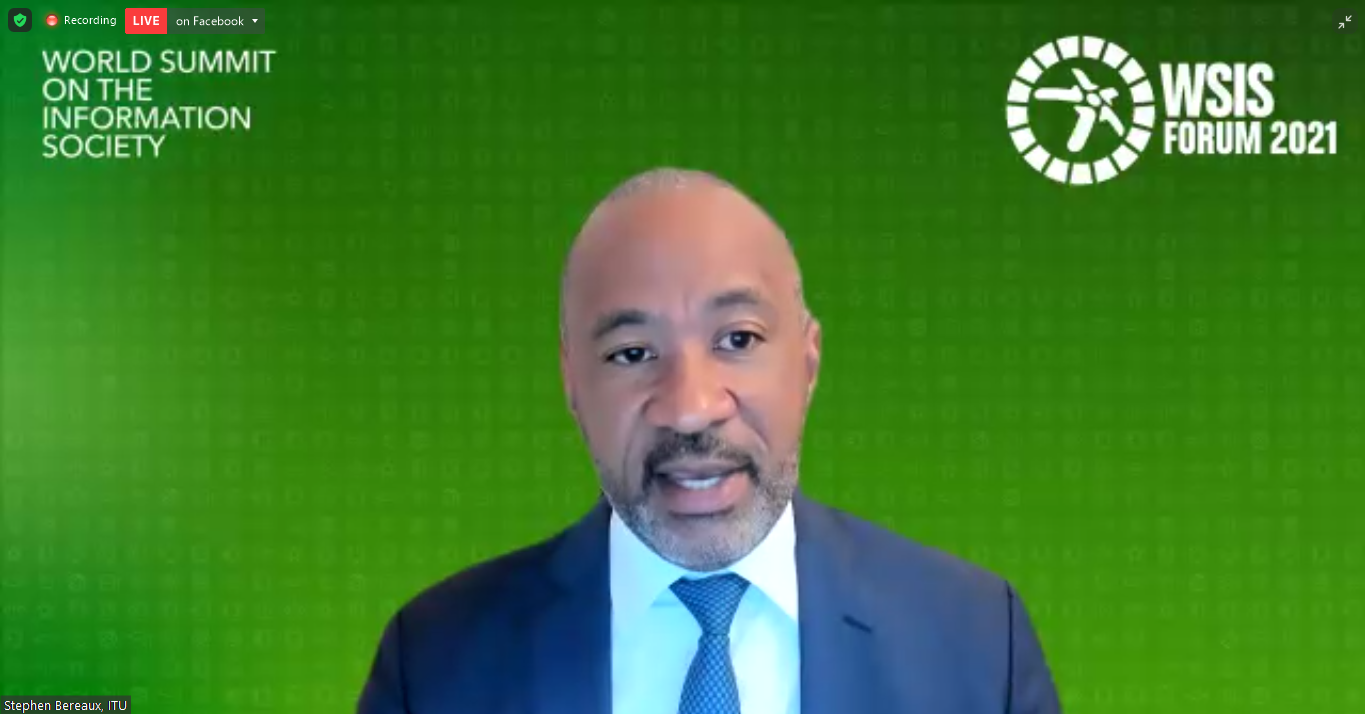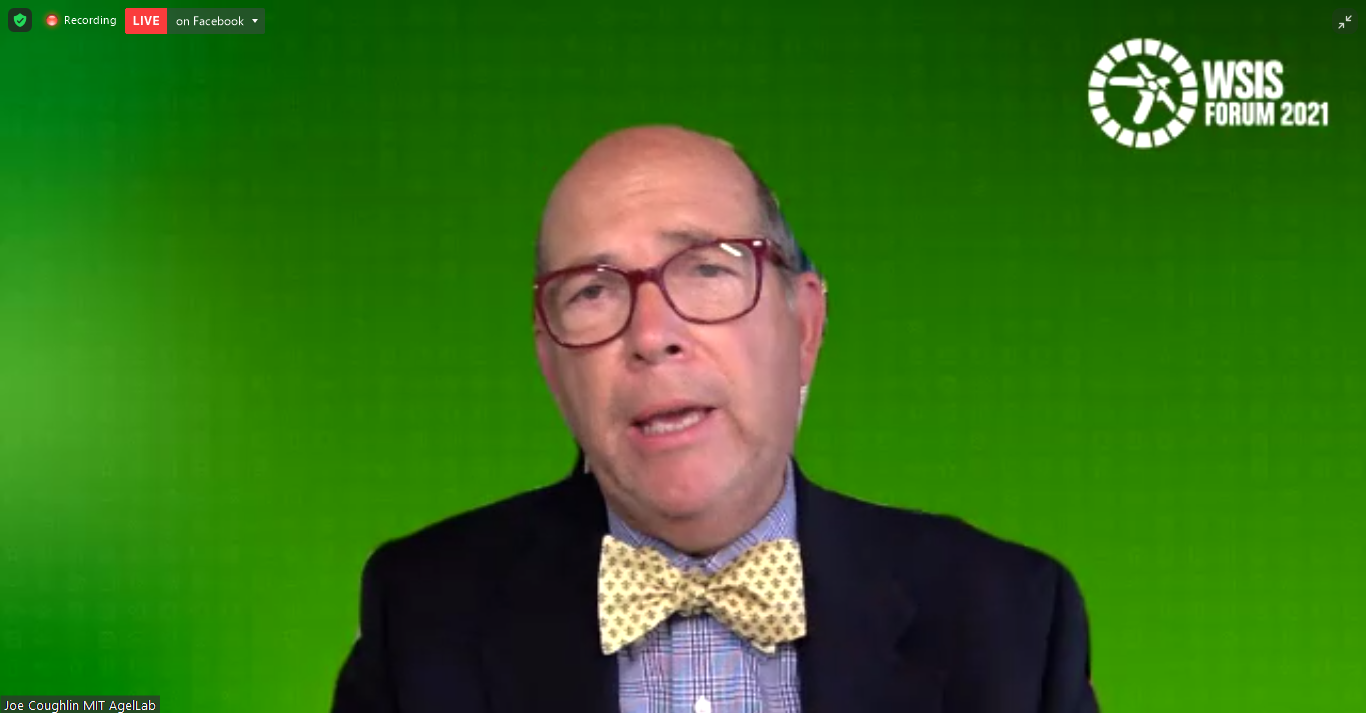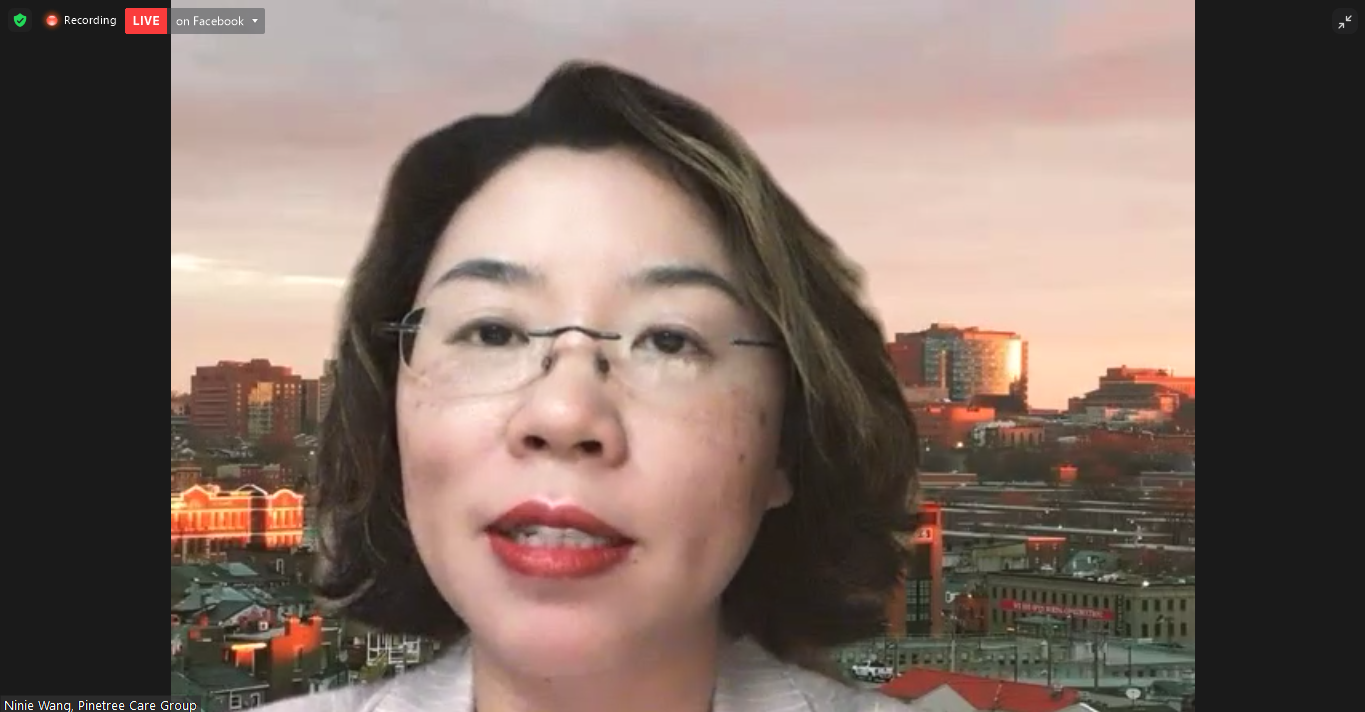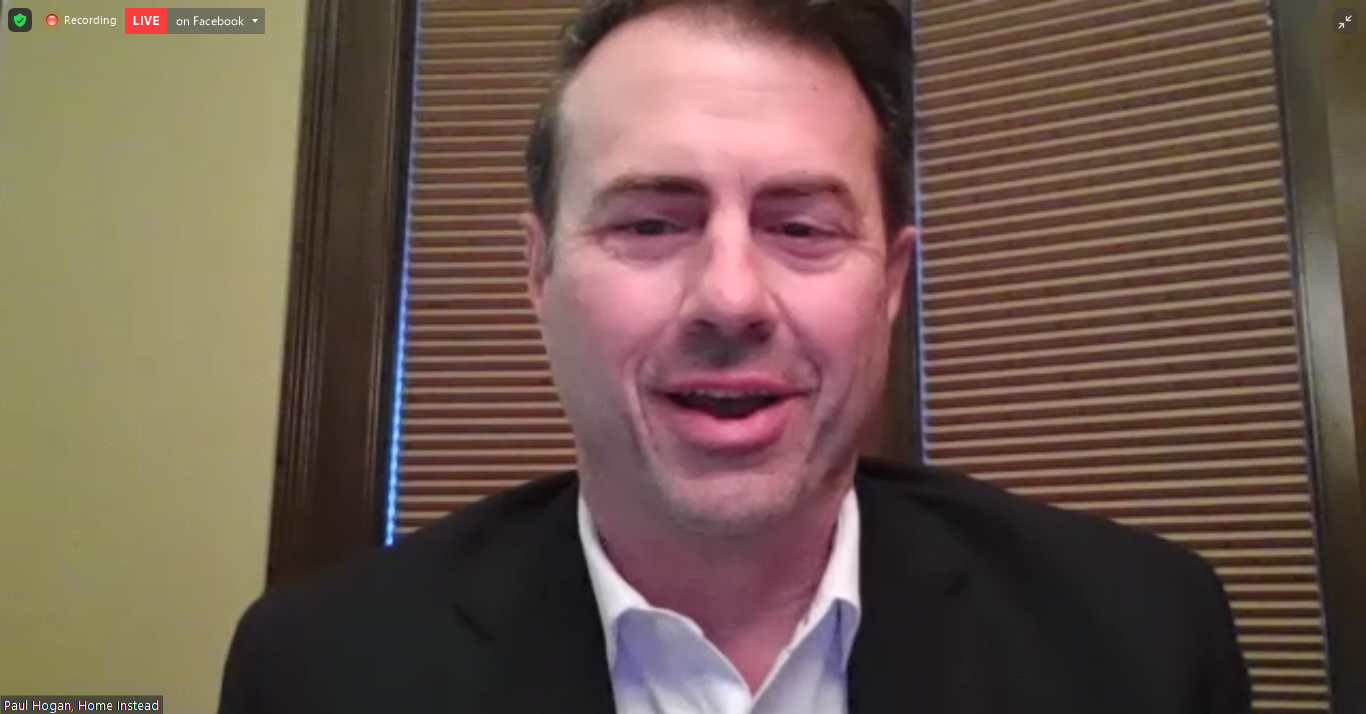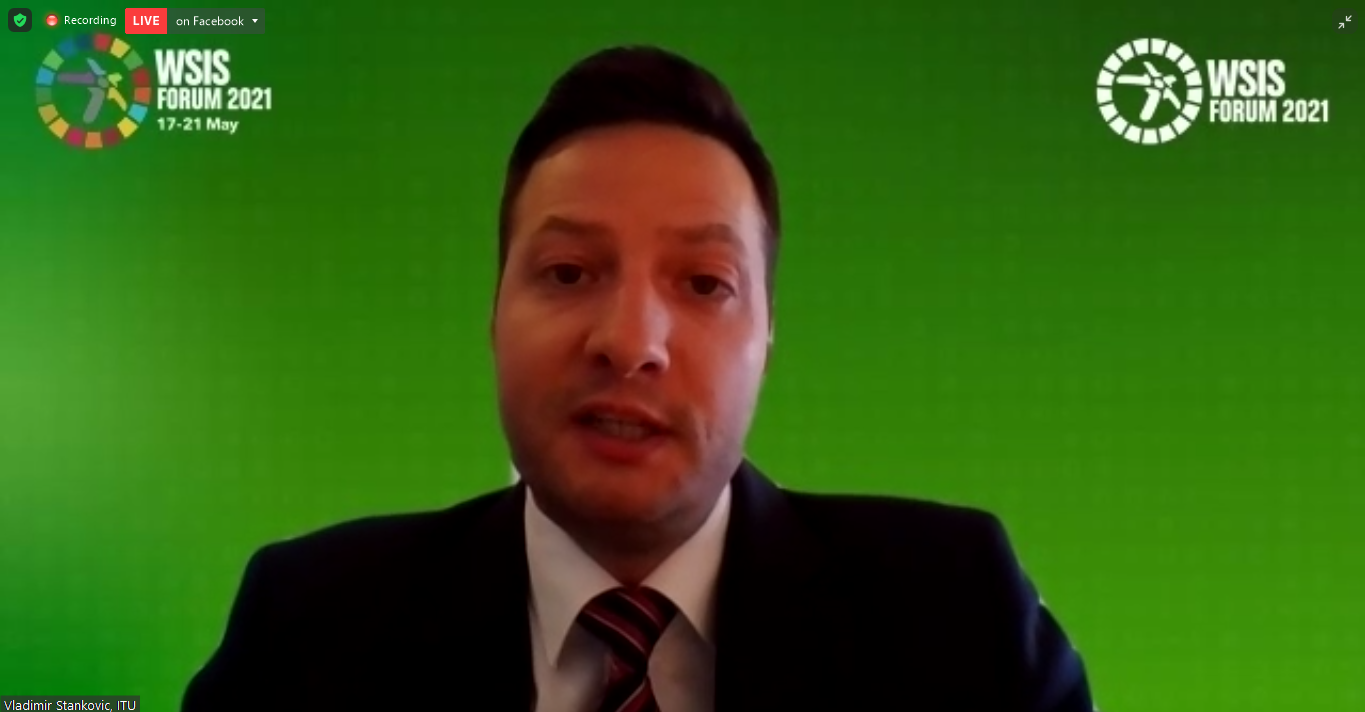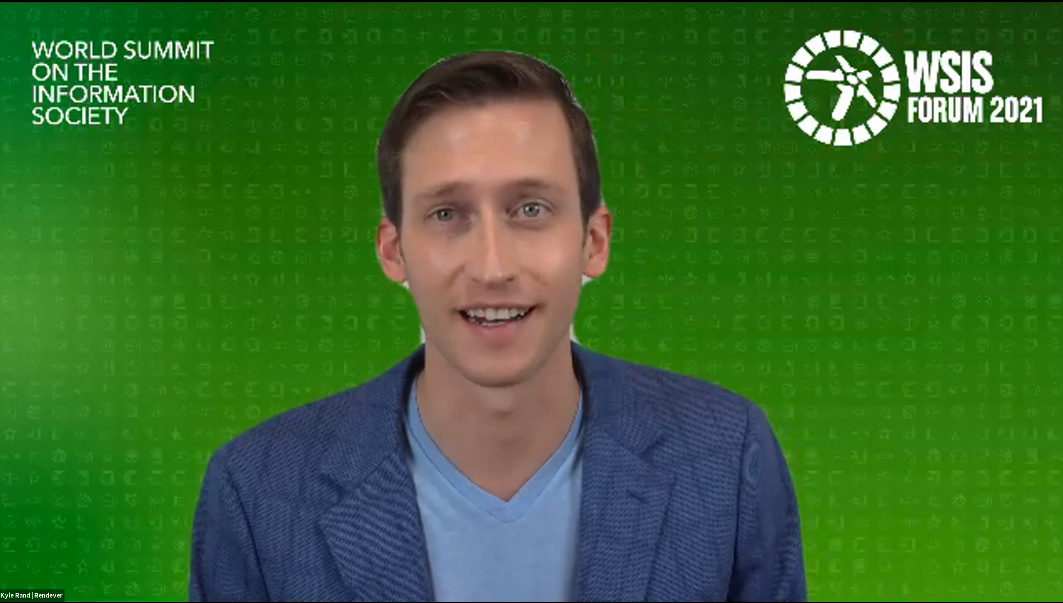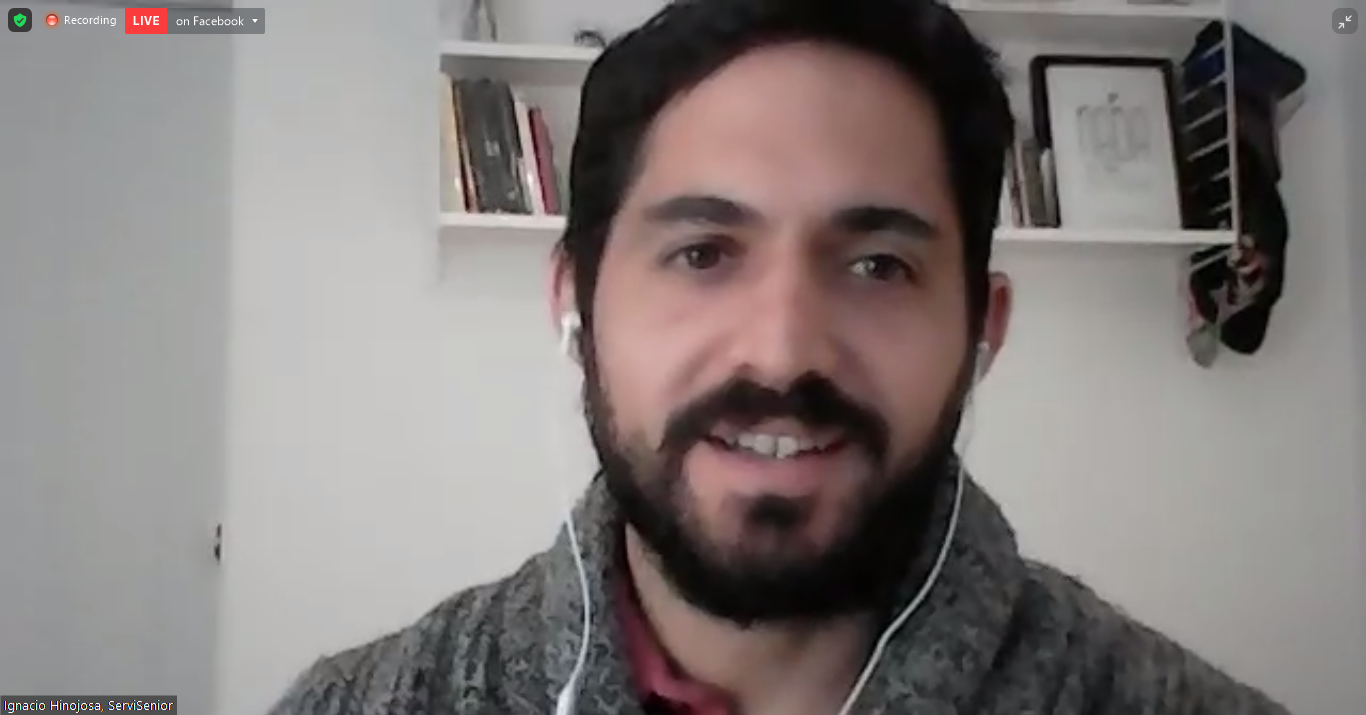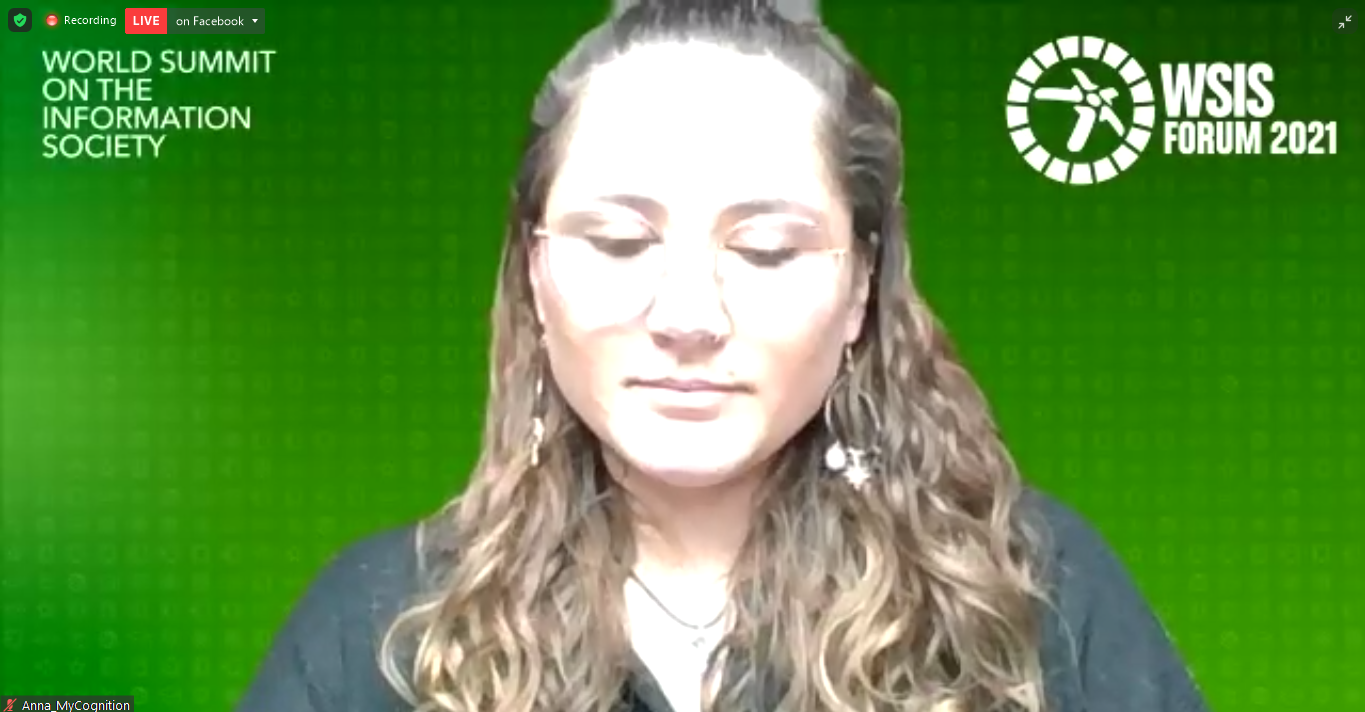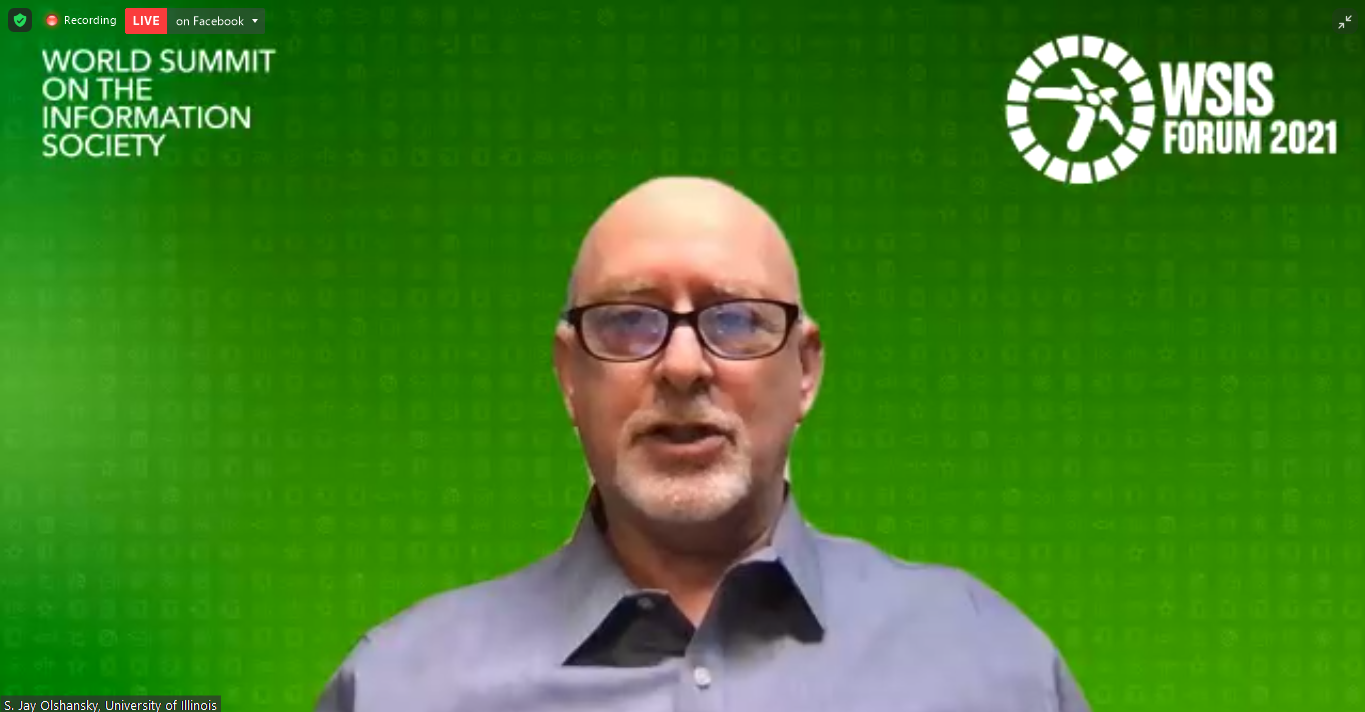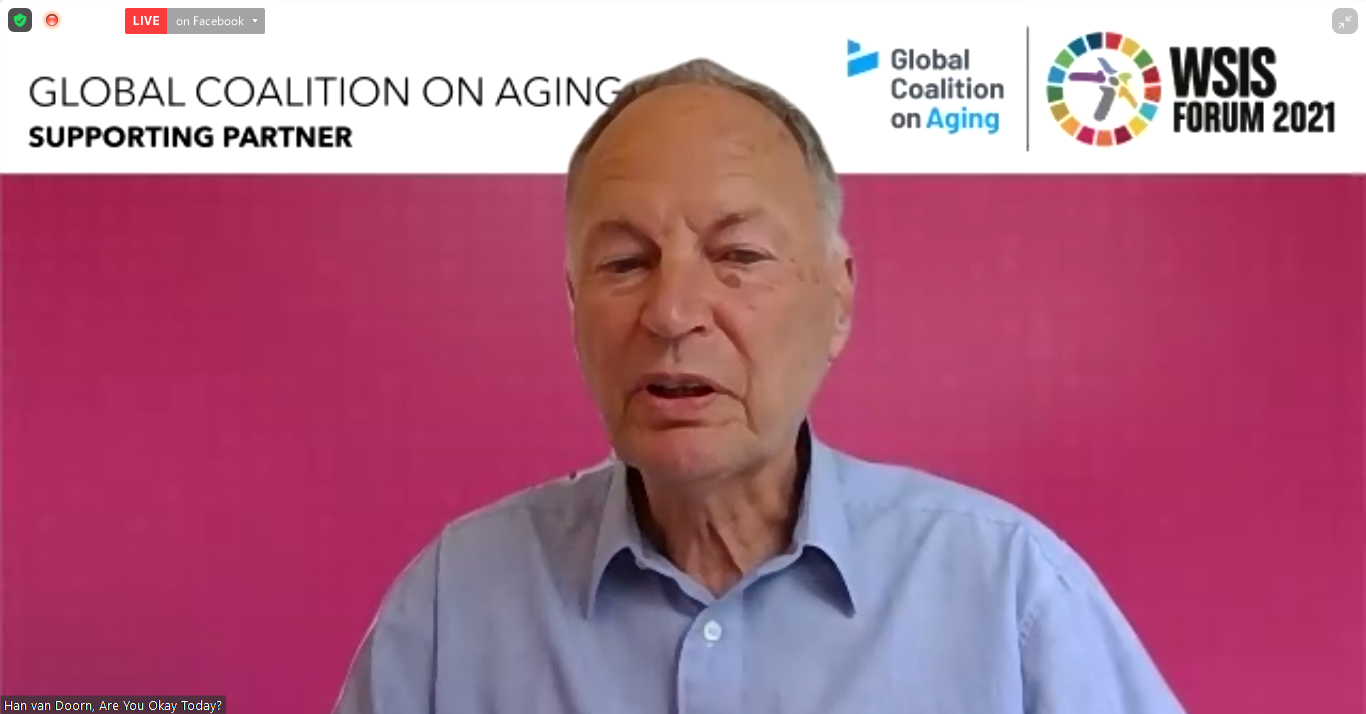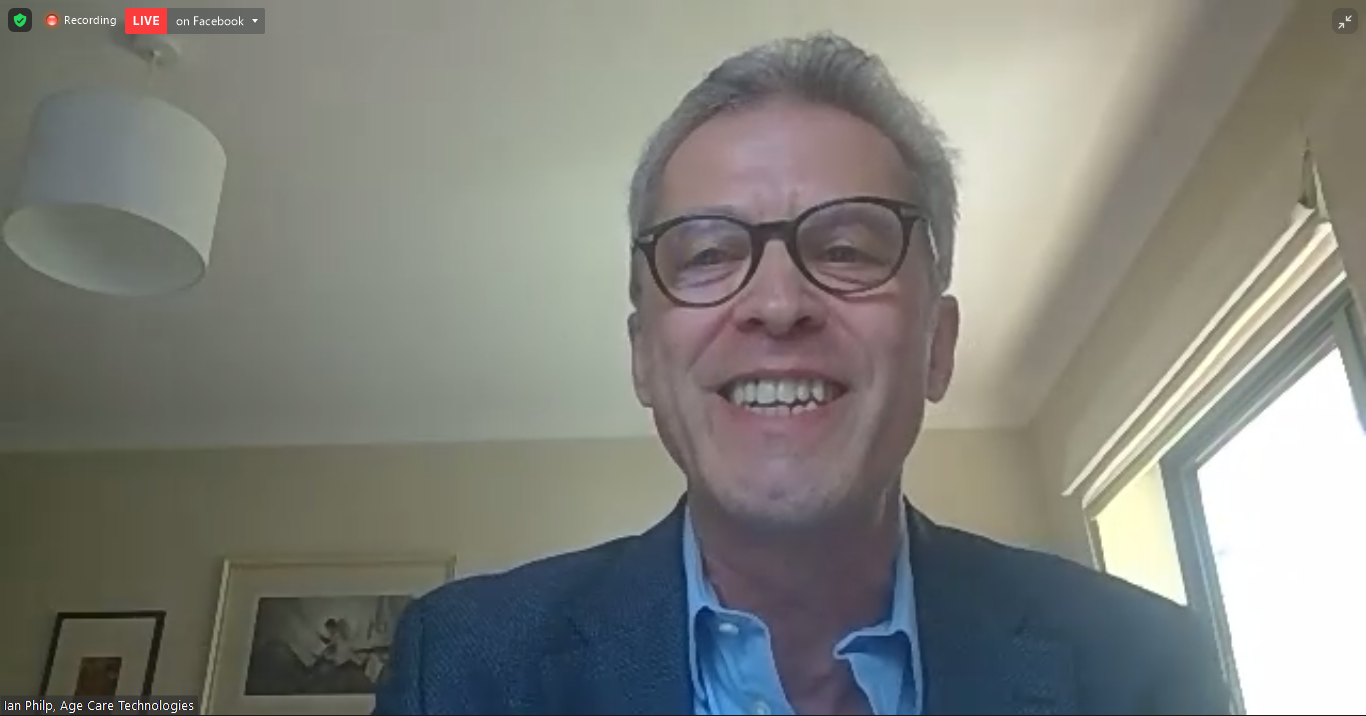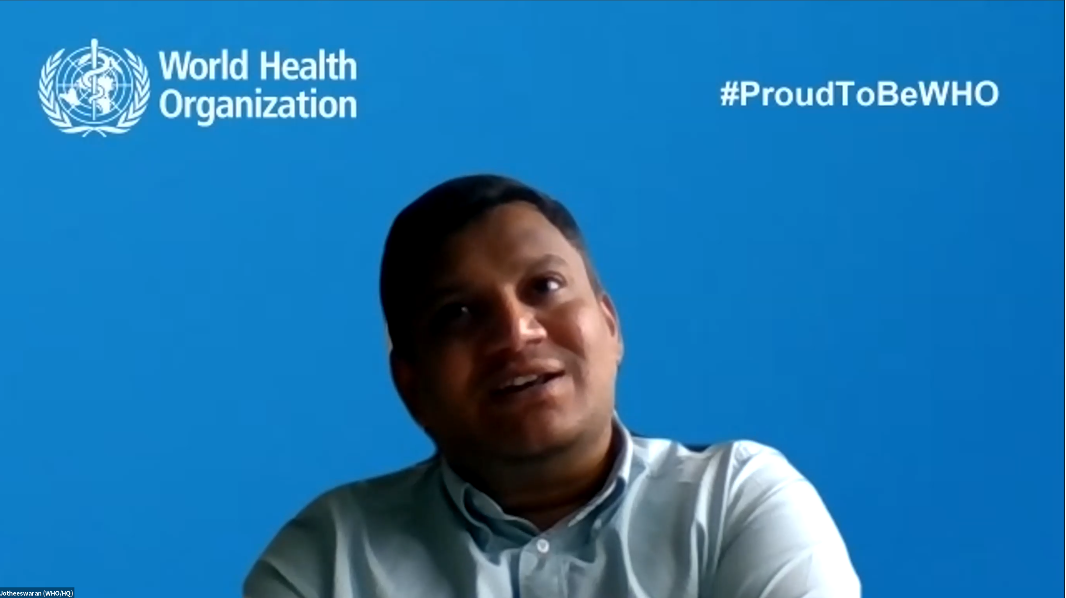Presentation of the WSIS Forum 2021 Healthy Ageing Innovation Prize Finalists
WSIS/GCOA
Session 423
WSIS Forum 2021: ICTs and Older Persons Special Track
This session is a part of the first ever WSIS Forum 2021 Healthy Ageing Innovation Prize focused on ICTs that specifically address the needs of people 60+ to achieve and sustain an active and engaged life as they age. As an exceptional international recognition of WSIS Stakeholders as leaders for their excellence in supporting innovation that brings sustainable solutions for the ever-increasing global population of older people, this session will be the opportunity to publicly announce the 12 finalists who have been shortlisted out of more than 80 ICT projects and recognized for their excellence.
- WSIS Forum is pleased to have initiated this special prize together with the Global Coalition on Aging GCOA, and in collaboration with other stakeholders, and already achieved remarkable results with more than 60 qualitative ICT projects submitted in the period 15 February - 15 April 2021.
- This session will be an opportunity for all to hear about this topic from the eminent Panel of Judges, as announced in the list of panelists to this session.
- The Finalists have been announced on 26 April and this session will be an opportunity to hear more about these ICT projects , which are enabling healthy ageing.
WSIS Forum 2021 Healthy Ageing Innovation Prize 12 Finalists:
Age Care Technologies (UK)
Age Care Technologies’ vision is to improve the lives of older people via four key components: ACT™ Assessment, ACT™ Training, ACT™ Analytics and ACT™ Advice. ACT™ Assessment is a digitized care planning tool which matches the needs of older people to local resources. ACT™ Training is a digital online or classroom-based learning programme for caregivers for older people. ACT™ Analytics uses anonymous information collected during use of ACT™ Assessments, to provide a unique, global dataset about the concerns, local resources, outcomes of intervention and trajectories in older people’s wellbeing, independence, social connection and health. These scores generated can be used with individuals as motivational tools to address concerns and with populations to describe levels of need, the impact of interventions and trajectories in health-related quality of life (independence, safety, security and wellbeing).
Age Care Technologies’ model has been found to be replicable in low, middle and high resources countries, across all WHO regions, and is the only system for person-centered assessment identified in several WHO reports as an example of best practice.‘Are you okay today’ (The Netherlands)
Are you okay Today (The Netherlands)
'are you okay today' uses electric appliances that are already present in the house such as a kettle, television or smartphone. The system learns the normal daily usage pattern of these devices. Using an app that shows a traffic light (red, yellow or green), the son or daughter check whether there is a deviation in this pattern at any time and see whether everything is still okay, without affecting the privacy of the senior.
Assistants for Safe Mobility (Germany)
The ASSAM project aims to compensate for declining physical and cognitive capabilities of elderly persons by user-centered development of modular navigation assistants for various mobility platforms, such as walker, wheelchair, and tricycle, providing sustained everyday mobility and autonomy with seamless transition from indoors to outdoors in environments such as residential complexes, the neighborhood quarter, or touristic areas. Modular assistance systems provide obstacle avoidance, navigational aid, cognitive assistance for visual impairment, and security by connection to a care center in emergency situations. The ASSAM Consortium includes many partners from Germany, the Netherlands, and Spain, and the ASSAM Alliance comprises industrial partners from Germany and Norway.
MyCognition (UK)
MyCognition is a holistic therapeutic platform that takes the form of an application that allows older people (50+) to improve cognitive reserve/resilience, and prevent cognitive deterioration. Insights are delivered in the form of Healthy Habits and Additional Learning which taken together are designed to boost cognitive growth and individual potential. Healthy Habits encompass lifestyle changes through to changes to work routines and work environments. Additional learning content provides detailed context to the science behind the MyCognition programme, helping individuals to better understand the drivers of cognitive fitness and how and why it can be improved. The app has been clinically proven to slow cognitive decline in older Parkinson's disease patients, receiving a 75% satisfaction rating. The app is NHS-approved.
OsteoLink (Denmark)
OsteoLink is a platform where people who care about osteoporosis can connect with each other, share their experience, find credible, up-to-date information about osteoporosis and learn from one another.
The International Osteoporosis Foundation, in partnership with the University of Geneva, developed the first version of OsteoLink in 2009. OsteoLink is managed by the International Osteoporosis Foundation, with support from IOF National Society members.
Rendever (US)
Rendever uses virtual reality and shared experiences to overcome loneliness and social isolation. Rendever’s headsets are networked together so participants all experience the same thing at the same time, and a conversational platform is built on top to craft dynamic and engaging conversations. In response to the pandemic, Rendever launched The Connection Corner, giving residents in different rooms a chance to come together and safely socialize in a virtual community room. VR avatars are personalized to look like each resident, so they can all sit “next to each other” together in VR and chat the same way they would before socially distancing.
ServiSenior (Chile/Uruguay)
ServiSenior addresses the lack of job opportunities for people over 50 years of age, who are active or who have already retired, and who want to generate additional income, to feel valued and useful. ServiSenior uses the gig economy to create flexible job opportunities for people over 50 years, connecting them with companies that need help to improve operational or administrative processes. To date, ServiSenior has helped more than 700 older adults connect with flexible job opportunities, allowing them to generate more than US$750,000 in total revenue and more than 200,000 hours of activity.
Voiceitt (US)
Voiceitt's speech recognition technology is designed to recognize and translate non-standard speech patterns. Its first product is a mobile application that translates unintelligible speech in real time, thus enabling users with speech impairments ("dysarthria") to communicate and be understood by voice. Voiceitt also supports voice commands for environmental control through integration with voice assistants, enabling the person with speech and motor impairments to perform basic tasks independently.
Walk With Path (Denmark)
Walk With Path has developed walking aids for Parkinson’s disease and sensory deficit. Its devices can be used by particulars to help prevent falls, and foster personalized understanding of wellness and health. Healthcare professionals can also use the devices to receive personalized metrics to deliver better care, real-time understanding, safer discharge from hospital and independent at home living such as falls risk predictors.
Wealthspan (US)
Wealthspan offers science-based estimates of lifespan and health span that are hyper-personalized based on inherited and acquired traits of individuals, couples, and families. These traits are then linked to data on accumulated and projected wealth with the goal of maintaining health span.
Buddy HomeCare (Thailand)
Since 2015, Buddy HomeCare (BHC), a social enterprise operated by the Foundation for Older Persons’ Development (FOPDEV), has been working on an innovative intergenerational approach to solve the dual problems of older people in need of care services and of indigenous youths living in poverty with limited educational opportunities. By leveraging smartphone technology with their community-based healthcare and monitoring system mobile app, Buddy HomeCare assists three target groups: older people with low incomes, older people with middle and high incomes, and youth with low incomes. BHC provides a 3-month training course for these youth with a curriculum designed by Chiang Mai University’s faculty of nursing. BHC has been able to roll out its program to include monthly visits to 45 customers and daily visits to 110 customers. BHC also works with the Karen people, a distinct ethnic group with their own language who live in Northern Thailand and Myanmar. There, BHC offers disadvantaged Karen youth training to become caregivers, providing them the opportunity to contribute to the wellbeing of older people while also offering them access to educational and better career opportunities.
Livelihood for the elderly through therapy and social transportation for tourism project from the Global Centre for Compliance, Hazards and Disaster Management (GLOCECOHADIM) (Cameroon)
The goal of this project is to create livelihood for the elderly through therapy and social transportation for tourism, by identifying elderly persons that are disabled, unable and unattended and to identify caregivers to the elderly, location and localization to normalize their social security on local transport, cultural identity and social affiliation to the various changes in society and well as stabilizing their walking and moving ability and assured transport facility by it using tricycle, motorcycles, support tools or free ambulance services.
The winning project will be showcased together with all valid submissions in the special WSIS Stocktaking: ICTs and Older Persons publication, while all submitted descriptions of projects and activities will be reflected on the WSIS Stocktaking platform. We invite all WSIS Stakeholders to participate in this session and meet our Finalists and Judges.
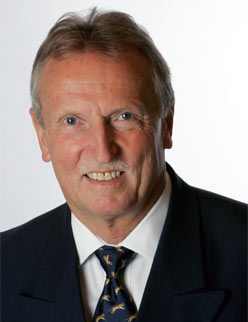

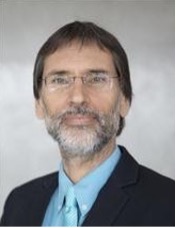
Dr Anshu Banerjee is the Senior Advisor for WHO's Department of Reproductive Health and Research including the UNDP/UNFPA/UNICEF/WHO/World Bank Special Programme of Research, Development and Research Training in Human Reproduction (HRP). He joined the Department in August 2015. In addition to his role as Senior Advisor to the Department, Dr Banerjee will lead WHO's work to operationalize the UN Secretary General's Global Strategy for Women’s, Children’s and Adolescents’ Health - a road map to end all preventable deaths of women, children and adolescents by 2030 and improve their health. Dr Banerjee will also work on the new Global Financing Facility (GFF) in support of the strategy.
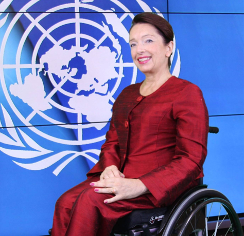
Ms. Daniela Bas, of Italian nationality, is the Director of the Division for Inclusive Social Development at the United Nations Department of Economic and Social Affairs since May 2011. Political scientist with a major in International Politics, she graduated Magna Cum Laude with a dissertation on “The elimination of architectural barriers and the employment of people with physical disabilities”. She is also a certified journalist and worked for the major press, Radio, and Television networks and is also a certified multicultural/life coach. Ms. Bas’s interest has always been people-centred in the various activities, associations, and professional roles she has held. In addition to her work at the United Nations from 1986 to 1995, she held managerial roles until 2000 in the private sector in Italy.
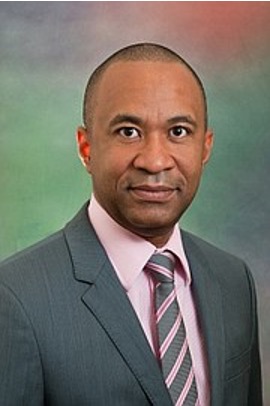
Stephen Bereaux is the Deputy to the Director of the ITU Telecommunication Development Bureau since 7 March 2020. Mr. Bereaux is an experienced regulator, with more than 20 years of executive and senior management experience in regulatory bodies in the Caribbean region. Prior to joining ITU, Mr Bereaux was Chief Executive Officer of the Utilities Regulation and Competition Authority (URCA), Bahamas which regulates the ICT and Electricity sectors, advises the Government on policies relating to those sectors, and represents The Bahamas at international sector related organisations such as the ITU. Prior to joining URCA in 2010, Mr. Bereaux served in senior management roles at the Telecommunications Authority of Trinidad and Tobago (TATT) from 2004. Before becoming a Regulator, Mr. Bereaux, an Attorney by profession since 1996, practiced law at multinational firms based in London and Hong Kong, specialising in Information Technology and Telecommunications Law.
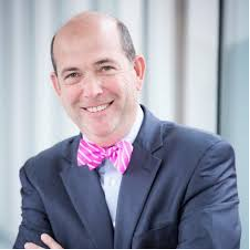
Joseph F. Coughlin, PhD is Director of the Massachusetts Institute of Technology AgeLab. He teaches in MIT's Department of Urban Studies & Planning and the Sloan School's Advanced Management Program. Coughlin conducts research on the impact of global demographic change and technology trends on consumer behavior and business strategy. He advises a wide variety of global firms in financial services, healthcare, leisure and travel, luxury goods, real estate, retail, technology, and transportation. Coughlin has served on advisory boards for firms such as Bell Canada, British Telecom, Daimler, Fidelity Investments and Sanofi-Aventis. He was appointed by President George W. Bush to the White House Advisory Committee on Aging and by Governor Charlie Baker to the Governor’s Council on Aging in Massachusetts where he co-chaired the Innovation & Technology Subcommittee. A Behavioral Sciences Fellow of the Gerontological Society of America and a Fellow of Switzerland’s World Demographics & Ageing Forum, Coughlin is a Senior Contributor to Forbes and writes regularly for MarketWatch and the Wall Street Journal. He was named by Fast Company Magazine as one the ‘100 Most Creative in Business’ and by the Wall Street Journal as inventing the future of retirement. Recently, Coughlin was recognized as one of 15 World Minds by the Zurich-based World Minds, a select community of global leaders in science, arts and business. His recent book, The Longevity Economy: Inside the World's Fastest Growing, Most Misunderstood Market (Public Affairs, 2017), is one of CEO READ’s Business Bestsellers. Follow him on Twitter @josephcoughlin
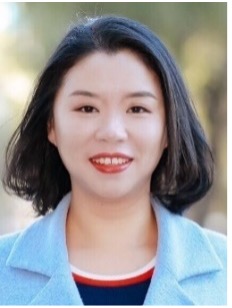
Ninie Yan WANG isFounder and CEO of Pinetree Care Group. In 2004, Ninie founded Pinetree Care Group, focusing on business model innovation, professional service and talent development in providing home healthcare services for the aging population. As a Standing Committee Member of the China Association of Gerontology and Geriatrics, China Social Welfare Service Standard Committee Member as well as a Member of Presidium for the National Union of Long-term Care, she is actively involved in domestic and international projects promoting healthy aging-related research, practice and policy. Ninie has published various papers on the restorative, integrated care service model and has participated in the drafting of various senior care industry standards and policy papers in China.
Ninie is a member of the WHO Clinical Consortium on Healthy Ageing and the World Economic Forum Global Future Council on Health and Healthcare. She has a BA Econ from UIBE, China, MBA from INSEAD in France and Singapore, and is a student of Johns Hopkins University - Tsinghua University joint DrPH program. Her international involvement includes WEF Young Global Leader (2013-2018) and the China Fellowship of the Aspen Global Leadership Network (since 2016). She was also selected to join the first France-China Young Leaders Program (2013).
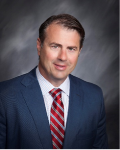
Paul is the Co-Founder of Home Instead, one of the first and most successful global home care companies in the world. Paul is a founding board member of the Home Care Association of America and the Home Instead Senior Care Foundation, an organization providing financial support to nonprofits dedicated to improving quality of life for seniors. Paul serves on the board of the World Dementia Council, is a governor for the Future of Health and Health Care System at the World Economic Forum (WEF), vice chair for the WEF Global Agenda Council on Ageing and as a steward for the WEF System on the Future of Education, Gender and Work.
For his success in exporting the home care business concept to other countries, Hogan was awarded the President’s “E” Award by the U.S. Department of Commerce in 2008, and in 2016, he received the “E” Star Award for continued excellence. In recognition of his contributions to franchising, Hogan was named the Entrepreneur of the Year for 2006 by the International Franchise Association.

Nuala Burke is the Clinical and Product Lead at Walk With Path, with a background in Biomedical Science and Occupational Therapy, Nuala designs digital health products with a user-centric approach. Nuala works with people across differing demographics, disease groups and health care professionals to ensure the product is designed to solve a problem whilst integrating into healthcare systems.

Sara is the co-founder and COO at Voiceitt, an AI startup that has developed a unique speech recognition technology to help people with disabilities live more independently. Sara holds an Economics degree from Barnard College at Columbia University in New York City, where she co-founded the Columbia Chapter of Net Impact, the international nonprofit which strives to orient business principles toward sustainable social goals. Passionate about socially-responsible business, high-ambition entrepreneurship, innovations in medical tech and accessibility technologies, and women's business leadership anywhere in the world. She lives in between New York and Tel Aviv.

A passion for improving the lives of seniors has always been at the forefront of my career; it drove me to co-found Rendever in 2016 and a few years later, I was honored for the work we’ve accomplished by being included in the 2019 Forbes 30 Under 30 Consumer Technology list.
After my grandmother moved into a senior living community, my family saw the impact social isolation had on her and other residents firsthand, and we learned that this wasn’t a unique experience for families. Recent surveys have found over 20% of older adults to be socially isolated, and research has proven that social isolation is as detrimental to one’s health as smoking 15 cigarettes per day. I set out to create a solution to this issue and serve the older adult population, leading to the launch of Rendever – a virtual reality platform that combats social isolation among older adults through the power of shared experiences.

Commercial Engineer from the University of Chile, with a major in Economics. After working in the venture capital sector in Chile, he participates in the creation of several social enterprises focused on the base of the pyramid. He was executive director of the high school entrepreneurship program AprendoEmprendo in 2014 and 2015.
ServiSenior was awarded the 2018 Avonni National Innovation Award in the Social Entrepreneurship category, it was part of the first generation of Huella, Start - Up Chile's triple impact accelerator in 2019 and in 2020 it was one of the 11 startups worldwide chosen to participate in the impact acceleration program of Katapult Accelerator (Norway) and selected by "Growth", Start-Up Chile's new program focused on scale-ups looking to go international.
He recently finished participating in the 2020 YLAI (Young Leaders for the Americas Initiative).


Ian Philp holds a Doctorate in Medicine from the University of Edinburgh and was a practicing physician for 35 years in the UK National Health Service.
As Professor of Health Care for Older People at the University of Sheffield, he led teams which won the UK hospital team of the year in the care of older people and the Queen’s Anniversary Prize for Higher Education for research into improving the quality of life of older people.
Ian has ten years’ experience as an Executive Medical Director of hospital and community services and from 2000-8 he was the National Clinical Director for Older People in England. His media contributions include including presenting the ITV programme “100 Years Younger In 21 days” and contributing to the ITV documentary “Only the Lonely” and the BBC programmes “Are You Younger Than You Think?”, “How to Live Longer” and “The Young Ones”.
Ian was also awarded a CBE in the Queen’s birthday honours in 2009 in recognition of his work to improve the lives of older people.

Professor in the School of Public Health at the University of Illinois at Chicago; Research Associate at the Center on Aging at the University of Chicago and at the London School of Hygiene and Tropical Medicine; Chief Scientist at Lapetus Solutions, Inc.
S. Jay Olshansky received his Ph.D. in Sociology at the University of Chicago in 1984. He is currently a Professor in the School of Public Health at the University of Illinois at Chicago, Research Associate at the Center on Aging at the University of Chicago and at the London School of Hygiene and Tropical Medicine, and Chief Scientist at Lapetus Solutions, Inc. The focus of his research to date has been on estimates of the upper limits to human longevity, exploring the health and public policy implications associated with individual and population aging, forecasts of the size, survival, and age structure of the population, pursuit of the scientific means to slow aging in people (The Longevity Dividend), and global implications of the re-emergence of infectious and parasitic diseases. Dr. Olshansky is on the Board of Directors of the American Federation of Aging Research; he is the first author of The Quest for Immortality: Science at the Frontiers of Aging (Norton, 2001) and A Measured Breath of Life (2013); and co-edited Aging: The Longevity Dividend (Cold Spring Harbor Laboratory Press, 2015). In 2016, Dr. Olshansky was honored with the Donald P. Kent Award from the Gerontological Society of America, the Irving S. Wright Award from the American Federation for Aging Research, and he was named one of Next Street’s Influencer in Aging.

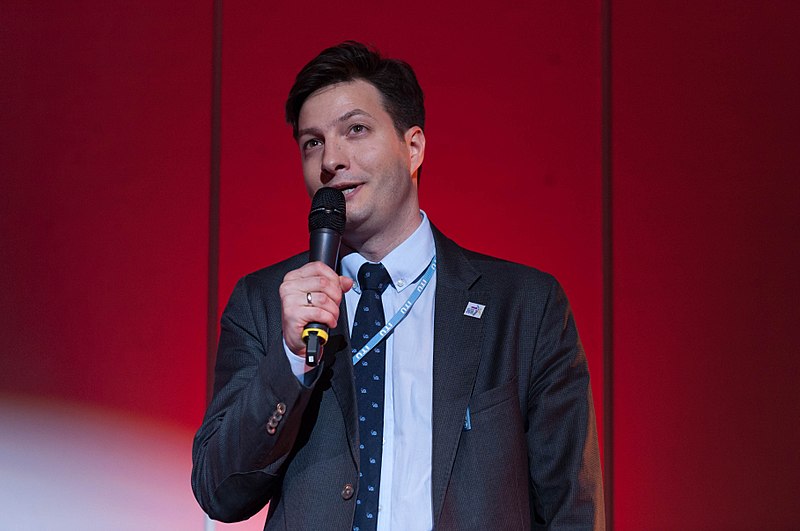
-
 C1. The role of governments and all stakeholders in the promotion of ICTs for development
C1. The role of governments and all stakeholders in the promotion of ICTs for development
-
 C2. Information and communication infrastructure
C2. Information and communication infrastructure
-
 C3. Access to information and knowledge
C3. Access to information and knowledge
-
 C4. Capacity building
C4. Capacity building
-
 C5. Building confidence and security in use of ICTs
C5. Building confidence and security in use of ICTs
-
 C6. Enabling environment
C6. Enabling environment
-
 C7. ICT applications: benefits in all aspects of life — E-government
C7. ICT applications: benefits in all aspects of life — E-government
-
 C7. ICT applications: benefits in all aspects of life — E-business
C7. ICT applications: benefits in all aspects of life — E-business
-
 C7. ICT applications: benefits in all aspects of life — E-learning
C7. ICT applications: benefits in all aspects of life — E-learning
-
 C7. ICT applications: benefits in all aspects of life — E-health
C7. ICT applications: benefits in all aspects of life — E-health
-
 C7. ICT applications: benefits in all aspects of life — E-employment
C7. ICT applications: benefits in all aspects of life — E-employment
-
 C7. ICT applications: benefits in all aspects of life — E-environment
C7. ICT applications: benefits in all aspects of life — E-environment
-
 C7. ICT applications: benefits in all aspects of life — E-agriculture
C7. ICT applications: benefits in all aspects of life — E-agriculture
-
 C7. ICT applications: benefits in all aspects of life — E-science
C7. ICT applications: benefits in all aspects of life — E-science
-
 C8. Cultural diversity and identity, linguistic diversity and local content
C8. Cultural diversity and identity, linguistic diversity and local content
-
 C9. Media
C9. Media
-
 C10. Ethical dimensions of the Information Society
C10. Ethical dimensions of the Information Society
-
 C11. International and regional cooperation
C11. International and regional cooperation
-
 Goal 1: End poverty in all its forms everywhere
Goal 1: End poverty in all its forms everywhere
-
 Goal 2: End hunger, achieve food security and improved nutrition and promote sustainable agriculture
Goal 2: End hunger, achieve food security and improved nutrition and promote sustainable agriculture
-
 Goal 3: Ensure healthy lives and promote well-being for all
Goal 3: Ensure healthy lives and promote well-being for all
-
 Goal 4: Ensure inclusive and equitable quality education and promote lifelong learning opportunities for all
Goal 4: Ensure inclusive and equitable quality education and promote lifelong learning opportunities for all
-
 Goal 5: Achieve gender equality and empower all women and girls
Goal 5: Achieve gender equality and empower all women and girls
-
 Goal 6: Ensure access to water and sanitation for all
Goal 6: Ensure access to water and sanitation for all
-
 Goal 7: Ensure access to affordable, reliable, sustainable and modern energy for all
Goal 7: Ensure access to affordable, reliable, sustainable and modern energy for all
-
 Goal 8: Promote inclusive and sustainable economic growth, employment and decent work for all
Goal 8: Promote inclusive and sustainable economic growth, employment and decent work for all
-
 Goal 9: Build resilient infrastructure, promote sustainable industrialization and foster innovation
Goal 9: Build resilient infrastructure, promote sustainable industrialization and foster innovation
-
 Goal 10: Reduce inequality within and among countries
Goal 10: Reduce inequality within and among countries
-
 Goal 11: Make cities inclusive, safe, resilient and sustainable
Goal 11: Make cities inclusive, safe, resilient and sustainable
-
 Goal 12: Ensure sustainable consumption and production patterns
Goal 12: Ensure sustainable consumption and production patterns
-
 Goal 13: Take urgent action to combat climate change and its impacts
Goal 13: Take urgent action to combat climate change and its impacts
-
 Goal 14: Conserve and sustainably use the oceans, seas and marine resources
Goal 14: Conserve and sustainably use the oceans, seas and marine resources
-
 Goal 15: Sustainably manage forests, combat desertification, halt and reverse land degradation, halt biodiversity loss
Goal 15: Sustainably manage forests, combat desertification, halt and reverse land degradation, halt biodiversity loss
-
 Goal 16: Promote just, peaceful and inclusive societies
Goal 16: Promote just, peaceful and inclusive societies
-
 Goal 17: Revitalize the global partnership for sustainable development
Goal 17: Revitalize the global partnership for sustainable development
